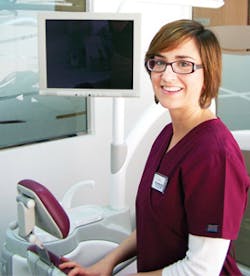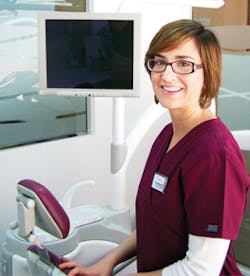'The weather is too nice' How Spain does dental hygiene
by JUDITH E. SULIK, RDH, MBA
¿Habla inglés?
That's what I asked the receptionist at a clínica dental I spotted as I was exploring the Puerta del Sol area of Madrid. My accent was embarrassingly awful, rusty from nearly 40 years of disuse, but I understood the word "no."
My daughter was spending a semester studying in Madrid and I couldn't resist the idea of visiting that culturally rich country for three weeks. It is indeed sad that after taking Spanish language classes for five years, my facility with the language would now earn me an "F." Indeed, my daughter pleaded with me to speak only English even though no one could understand me in either language. While there, I learned that it is a bit easier to understand people speaking than it is to speak a foreign language. I also read, and found to be true, that in the United States, English speakers talk more loudly to someone who doesn't speak English well, as if hearing words you don't understand will make the meaning clearer. However, the article said, and I agree, in Spain people speak more rapidly, leaving someone like me even more perplexed. Fortunately, I recalled directional words like recto (straight), derecha (right), and izquierda (left). "¿Dónde está?" (Where is?) came in handy when my husband and I got on the wrong bus. The most important sentence that I repeated constantly and mentioned before was "¿Habla inglés?"
There I was, wandering alone, losing my sense of direction, not realizing that the streets, built during the Middle Ages, were like spokes in a wheel; once I forgot where the hub was I began to panic, popping into stores repeating "¿Habla inglés?" and showing the shopkeeper my map while sputtering, "¿Dónde está la calle Arenal?"
Once oriented, I started thinking about what I would do if I had a dental emergency, let alone a medical incident. Were there any dental practices in Madrid where the dentist spoke English? Was it presumptuous of me to expect that? If I were, for example, a Bulgarian visiting the United States, would I expect to find a dentist fluent in my native language?
Well, by serendipity, I picked up a free newspaper outside our hotel that was published primarily for Brits spending time in Madrid. And there I saw an ad for Azuara Dental, welcoming English speakers!
Questions had been swirling in my mind about dentistry in Spain: Do offices employ dental hygienists? If yes, are their educational requirements different from ours? Are the practices operated differently than in the United States? Is the educational trajectory for dentists more similar to those in Mexico or the U.S.? Now that I'd found a practice where I could ask my questions in English and hear the answers in the same language, I decided to call the number and ask if the dentist would like to be interviewed for an article in RDH magazine.
I made the call using my standard opening. "Hola. ¿Habla inglés?" I didn't understand one word of the response! Thank goodness my daughter was sitting by my side because, to her consternation, I thrust the phone at her and asked her to have the conversation for me. The doctor was not in but she'd return my call. It probably was naive of me to expect everyone in the practice to speak English! When I did speak with Dra. Ainhoa Araúz López, I discovered she speaks perfect, fluent, unaccented English – she began studying English in first grade.
Those children (or, most likely, the parents with dreams for their offspring) who want to pursue advanced degrees in Spain generally begin their plan almost literally on the first day they begin school. Tests, and the anticipated need for each profession, determine if one's goal will be achieved. Araúz explained that, as in the U.S., students pay university tuition, but it is not excessively expensive in Spain. She told me that in order to enter dental school, one must gain the equivalent of a bachelor's degree and then take the "selectivity exam," which includes different subjects of general knowledge and specific subjects in science, if one wants to go for dental studies. A student's school grade and exam grade are averaged. That average must then meet the requirement set by the dental school. However, that is not the only route to becoming a dentist.
Azuara Dental is located in a suburban area of Madrid, so I rode the wonderfully efficient Metro de Madrid for 45 minutes, changing trains a couple of times, until I arrived at the office.
The space is bright and cheerful and looks like any office in the United States. Araúz opened her own practice in 2008 after working for others for five years. Americans are used to seeing dental specialists with their own practices, but she explained that she employs an orthodontist, oral surgeon (who does perio and dental implants), and an endodontist. These professionals travel among practices rather than having their own. She said, "I need to offer what patients ask for. There are a lot of dentists in Madrid. If I refer out, the patients may not return, so I try to offer everything, digital X-rays, whitening. In Spain, every dentist can do everything." She continued, "It takes two to three years to become a specialist. Right now the dental school is working with the authorities on regulations for those specialties. Historically, there has been no legal requirement to perform those skills, so some older dentists try to do it all." She said her philosophy is "to offer my patients what I would offer my dad. I always use their first name – I kiss them all. I know the family." She also offers the first appointment and estimate as a free service.
Because it is unusual to find a practice with an English-speaking dentist, expatriates seek her out. This is also a way she can differentiate her practice from others. She said, "Some patients travel an hour to get here; some are students; others are businesspeople. Many refer others looking for an English speaking dentist to me."
Araúz explained that Spain has a national health system, but medical competencies are transferred to different regions. She said, "Each state has its own program, and laws vary from state to state. Andalucía (Andalusia) has a program with more social benefits because their government is Democratic/Socialist; other regions are more conservative, such as Cataluña (Catalonia). Spain used to have free health care, but now those in power want people to pay for prescriptions, etc. The current president is more conservative."
Spain's economic crisis has only worsened since my visit and it is having an effect on dental practices. Araúz noted that the government doesn't cover dental care except for dental exams, preventive treatments, and extractions. She said, "Revisions, or dental screenings, are performed at ambulatorios (primary care centers) in each neighborhood. Employees at these sites include a general medical doctor, a pediatrician, and nurses who take patients' blood pressure. Some locations have dentists to perform screenings and dental extractions, and sometimes a dental hygienist is employed to provide topical fluoride treatments, sealants, and, perhaps, oral health instruction. Cleanings are not provided -- instead, referrals are made to a dentist." Also, while dental hygiene in the U.S. began in a school setting, it is uncommon to see this relationship in Spain.
Araúz said dental health is improving in the big cities. "It used to be that a person would seek care when a tooth hurt and then the dentist would extract it. Now more people are taking more conservative action by taking preventive measures and making six-month or annual appointments. Fluoride in the water is preventive and leading to better dental health for kids. There are still a lot of cavities, but it depends on the area. Sometimes if the kids don't want to brush, the parent says, ‘Okay, go to bed.'"
She notes that dental hygiene is an emerging profession. She said, "Dental hygiene was not popular until recently."
Araúz has employed her dental hygienist, Silvia, since she opened her practice. She is 25 years old, single, and lives in Madrid, though she is from Andalucía (Andalusia). I did not get an opportunity to meet her. Her goal is to eventually become a dentist. Araúz explained that for Silvia to become a dentist now, she will have to enroll in a two-year high level professional training program after finishing school. A hygienist can continue from the one-year program into the high level professional training program. After the high level professional training, the hygienist can obtain an average mark that provides access to the university, but only if the average mark equals the minimum required in the university, without having had to take the high level exam Araúz herself took after the bachelor's degree. Interestingly, it is not typical for students to live at school -- most live at home with their families. The benefit is that the hygienist can earn a salary while going to dental school. The downside is that it takes much longer this way. But it is doable, and it's Silvia's plan. Araúz explained, "After doing the high level professional training, [Silvia] got an average mark, but as the dental school asks for a high entrance mark, hygienists usually need to increase that mark by having extra exams. Before doing that and going to the dental school, she wants to work as a hygienist for several years."
There are similarities and differences between how Silvia practices compared with an American hygienist's schedule. Dra. Araúz spends 30 to 45 minutes with a new patient. During this appointment, after performing a complete exam, she explains everything she has seen to the patient, including whether or not a specialist should be seen. Using the Cavitron, Silvia will spend a half hour on the prophy and about five minutes giving oral hygiene instruction. Araúz said, "In Spain, it's not as common for hygienists to do periodontal scaling; a specialist does the initial root planing. The periodontist will also probe the pockets at the first appointment as well as the scaling and root planing. At the next appointment, if the pockets have shrunk, the patient will again see the hygienist. If there has been no improvement, the specialist will perform periodontal surgery."
Working hours are different, too. The office does not open until 10:30 in the morning. Lunch Monday through Thursday is "a couple of hours." On Friday, the break is 90 minutes. The siesta lives on in Madrid, but not for Araúz and her staff, who do not partake of that tradition. Its existence, however, does affect them because it extends the working day sometimes, Araúz said. "We're here as late as 10:30 at night." The hygienist has afternoon hours Monday through Friday. No one ever works on Saturday because, she explained, "The weather is too nice. Patients don't come." Realism prevails.
On a lighter note, and one that epitomizes the professional ambience Araúz wants to create, her uniform color complements the office's decor. Indeed, patients jocularly call her the "matching doctor," summing up the dedication she has toward her patients with the phrase "Sin siesta para la doctora conjuntada" – that is, "No siesta for the matching doctor." RDH
JUDITH E. SULIK, RDH, MBA, is president of Finally Finished Press of Middleton, Wis. She recently published a cookbook based on Madison, Wisconsin-area restaurants. For details, contact her by e-mail at [email protected].
Past RDH Issues

